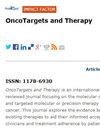早老素通过调节 Paxillin 的表达抑制黑色素瘤细胞的增殖和迁移
IF 2.7
4区 医学
Q3 BIOTECHNOLOGY & APPLIED MICROBIOLOGY
引用次数: 0
摘要
目的:哈钦森-吉尔福德早衰综合症(HGPS)的病因--早老素(Progerin)对正常细胞和早衰患者的影响已被广泛研究。然而,关于它对肿瘤细胞的具体影响却缺乏研究。黑色素瘤是最常见的恶性肿瘤之一,发病率和死亡率都很高。本研究旨在阐明早老素在黑色素瘤中的潜在治疗作用:我们构建了稳定表达早老素的黑色素瘤 A375 细胞系和 M14 细胞系。用 Western 印迹法测定了每组细胞中早老素、paxillin 和上皮-间质转化(EMT)标志蛋白的表达。使用Transwell试验、伤口愈合试验、集落形成试验、CCK 8试验和流式细胞术评估了癌细胞的迁移、增殖和细胞周期。利用 RT-qPCR 技术检测了早衰素过表达对 microRNA 表达的影响。最后,我们将paxillin转染至早衰素过表达细胞组,以验证早衰素是否通过paxillin调控肿瘤细胞的表型:我们的研究表明,过表达早老素会导致 paxillin 的表达减少,并抑制癌细胞的迁移、增殖、EMT 过程和细胞周期的进展。此外,拯救实验表明,通过转染含有 paxillin 基因的质粒,可以部分恢复过表达早老素的癌细胞的迁移、增殖能力和 EMT 标记蛋白的表达。机理研究进一步发现,早老素是通过上调 miR-212 来抑制 paxillin 表达的:本研究发现,早老素可通过 miR-212/paxillin 轴抑制黑色素瘤细胞的迁移和增殖,这为今后治疗该疾病提供了一种新的方法。本文章由计算机程序翻译,如有差异,请以英文原文为准。
Progerin Inhibits the Proliferation and Migration of Melanoma Cells by Regulating the Expression of Paxillin
Objective: Progerin, the underlying cause of Hutchinson-Gilford Progeria Syndrome (HGPS), has been extensively studied for its impact on normal cells and premature aging patients. However, there is a lack of research on its specific effects on tumor cells. Melanoma is one of the most common malignant tumors with high morbidity and mortality. This study aimed to elucidate the potential therapeutic role of progerin in melanoma.
Materials and Methods: We constructed the melanoma A375 cell line and M14 cell line with stable expression of progerin. The expression of progerin, paxillin, and epithelial-mesenchymal transition (EMT) marker proteins in each cell group was measured using Western blot. The migration, proliferation, and cell cycle of cancer cells were assessed using the transwell assay, wound healing assay, colony formation assay, CCK 8 assay, and flow cytometry. RT-qPCR technology was used to examine the impact of progerin overexpression on microRNA expression. Finally, we transfected paxillin into the progerin overexpression cell group to verify whether progerin regulates the phenotype of tumor cells through paxillin.
Results: Our study demonstrated that overexpression of progerin leads to decreased expression of paxillin and inhibits cancer cell migration, proliferation, EMT process and cell cycle progression. Additionally, rescue experiments revealed that the migration, proliferation ability, and EMT marker protein expression in progerin overexpressing cancer cells could be partially restored by transfecting a plasmid containing the paxillin gene. Mechanistic investigations further revealed that progerin achieves this inhibition of paxillin expression by upregulating miR-212.
Conclusion: This study reveals that progerin may inhibit the migration and proliferation of melanoma cells through the miR-212/paxillin axis, which provides a new approach for the future treatment of this disease.
Keywords: progerin, paxillin, migration, proliferation, melanoma
Materials and Methods: We constructed the melanoma A375 cell line and M14 cell line with stable expression of progerin. The expression of progerin, paxillin, and epithelial-mesenchymal transition (EMT) marker proteins in each cell group was measured using Western blot. The migration, proliferation, and cell cycle of cancer cells were assessed using the transwell assay, wound healing assay, colony formation assay, CCK 8 assay, and flow cytometry. RT-qPCR technology was used to examine the impact of progerin overexpression on microRNA expression. Finally, we transfected paxillin into the progerin overexpression cell group to verify whether progerin regulates the phenotype of tumor cells through paxillin.
Results: Our study demonstrated that overexpression of progerin leads to decreased expression of paxillin and inhibits cancer cell migration, proliferation, EMT process and cell cycle progression. Additionally, rescue experiments revealed that the migration, proliferation ability, and EMT marker protein expression in progerin overexpressing cancer cells could be partially restored by transfecting a plasmid containing the paxillin gene. Mechanistic investigations further revealed that progerin achieves this inhibition of paxillin expression by upregulating miR-212.
Conclusion: This study reveals that progerin may inhibit the migration and proliferation of melanoma cells through the miR-212/paxillin axis, which provides a new approach for the future treatment of this disease.
Keywords: progerin, paxillin, migration, proliferation, melanoma
求助全文
通过发布文献求助,成功后即可免费获取论文全文。
去求助
来源期刊

OncoTargets and therapy
BIOTECHNOLOGY & APPLIED MICROBIOLOGY-ONCOLOGY
CiteScore
9.70
自引率
0.00%
发文量
221
审稿时长
1 months
期刊介绍:
OncoTargets and Therapy is an international, peer-reviewed journal focusing on molecular aspects of cancer research, that is, the molecular diagnosis of and targeted molecular or precision therapy for all types of cancer.
The journal is characterized by the rapid reporting of high-quality original research, basic science, reviews and evaluations, expert opinion and commentary that shed novel insight on a cancer or cancer subtype.
Specific topics covered by the journal include:
-Novel therapeutic targets and innovative agents
-Novel therapeutic regimens for improved benefit and/or decreased side effects
-Early stage clinical trials
Further considerations when submitting to OncoTargets and Therapy:
-Studies containing in vivo animal model data will be considered favorably.
-Tissue microarray analyses will not be considered except in cases where they are supported by comprehensive biological studies involving multiple cell lines.
-Biomarker association studies will be considered only when validated by comprehensive in vitro data and analysis of human tissue samples.
-Studies utilizing publicly available data (e.g. GWAS/TCGA/GEO etc.) should add to the body of knowledge about a specific disease or relevant phenotype and must be validated using the authors’ own data through replication in an independent sample set and functional follow-up.
-Bioinformatics studies must be validated using the authors’ own data through replication in an independent sample set and functional follow-up.
-Single nucleotide polymorphism (SNP) studies will not be considered.
 求助内容:
求助内容: 应助结果提醒方式:
应助结果提醒方式:


